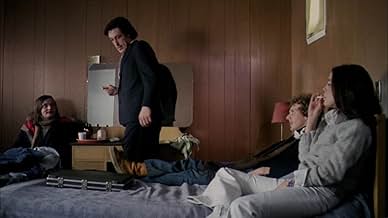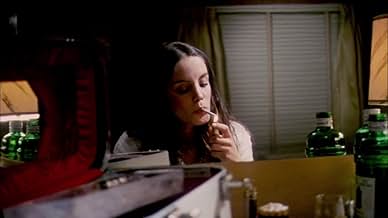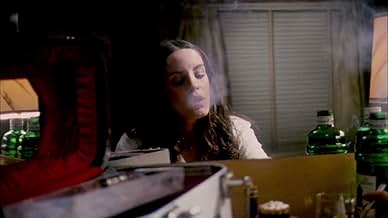A beautiful stripper hires renowned criminals to exact revenge on those who raped her in her motel room.A beautiful stripper hires renowned criminals to exact revenge on those who raped her in her motel room.A beautiful stripper hires renowned criminals to exact revenge on those who raped her in her motel room.
- Director
- Writers
- Stars
- Director
- Writers
- All cast & crew
- Production, box office & more at IMDbPro
Featured reviews
While Gina is a solid entry in the 70's film canon of chicks who get brutal revenge on men who rape them, it is also quintessentially Canadian (or, more accurately, Quebecois). All of the classic elements are there - the slow pacing which builds to the explosive last act, the electric guitar title music, the star getting naked, the gang-rape, the muscle car chase, the bloody finale...except in this case the setting is a town in Quebec in the middle of winter, the gang rides snowmobiles instead of motorcycles - and there is a film crew attempting to make a documentary expose on the local exploitive textile mill. Gina has a great socio-realist feel, AND a roaring purple Plymouth 383 Roadrunner. Yes!
"Gina," a Canadian film from 1975, is a curious beast. On the surface, it ticks all the boxes of a typical rape-revenge exploitation film of its era. However, beneath the surface, it offers a unique and compelling narrative that explores broader ideas and themes.
The story follows the title character, Gina, a stripper who is sent to perform at a rural bar in the middle of winter. When she is brutally attacked, she embarks on a violent mission of revenge with the help of her pimp and their henchmen.
What sets "Gina" apart from its contemporaries is director and co-writer Denys Arcand's approach to the material. Arcand, known for his thought-provoking films like "The Barbarian Invasions," uses the exploitative elements as a hook to delve into deeper territory. The sex and violence are undeniably attention-grabbing, but they serve a greater purpose in this film.
"Gina" is an intriguing blend of arthouse and grindhouse. It's a film that challenges its audience, offering a unique take on the revenge narrative. The grit and grime of the setting and the brutal nature of the story are juxtaposed with a thoughtful exploration of human nature and the consequences of violence.
However, despite its ambitious approach, "Gina" falls short of being a truly remarkable film. While it has its moments of brilliance, the overall execution feels uneven. The pacing is often sluggish, and the tone veers wildly from one scene to the next. It is a film that keeps you engaged, but more in the sense of curiosity about where it will go next rather than genuine investment in the characters or their journeys.
That being said, "Gina" is worth watching for those interested in the evolution of exploitation cinema and its intersections with arthouse storytelling. The film's supplementary features, including interviews with Arcand and cast members, as well as a video essay by rape-revenge film scholar Alexandra Heller-Nicholar, provide valuable context and insights into the film's creation and impact.
In conclusion, "Gina" is a fascinating experiment in genre filmmaking that, while not entirely successful, offers a unique and thought-provoking experience.
The story follows the title character, Gina, a stripper who is sent to perform at a rural bar in the middle of winter. When she is brutally attacked, she embarks on a violent mission of revenge with the help of her pimp and their henchmen.
What sets "Gina" apart from its contemporaries is director and co-writer Denys Arcand's approach to the material. Arcand, known for his thought-provoking films like "The Barbarian Invasions," uses the exploitative elements as a hook to delve into deeper territory. The sex and violence are undeniably attention-grabbing, but they serve a greater purpose in this film.
"Gina" is an intriguing blend of arthouse and grindhouse. It's a film that challenges its audience, offering a unique take on the revenge narrative. The grit and grime of the setting and the brutal nature of the story are juxtaposed with a thoughtful exploration of human nature and the consequences of violence.
However, despite its ambitious approach, "Gina" falls short of being a truly remarkable film. While it has its moments of brilliance, the overall execution feels uneven. The pacing is often sluggish, and the tone veers wildly from one scene to the next. It is a film that keeps you engaged, but more in the sense of curiosity about where it will go next rather than genuine investment in the characters or their journeys.
That being said, "Gina" is worth watching for those interested in the evolution of exploitation cinema and its intersections with arthouse storytelling. The film's supplementary features, including interviews with Arcand and cast members, as well as a video essay by rape-revenge film scholar Alexandra Heller-Nicholar, provide valuable context and insights into the film's creation and impact.
In conclusion, "Gina" is a fascinating experiment in genre filmmaking that, while not entirely successful, offers a unique and thought-provoking experience.
To the best of my knowledge, there is no English version of this film, aside from subtitles, which I had to find on the internet (my DVD was completely in French), thus dooming this film to a higher level of obscurity than it deserves. It's a good movie and, while some might write if off as an exploitation flick, it's a little more cerebral than that and deserves a little more credit. The general bleakness and crumminess of the hotel and the town itself were things I could really relate to and the way that all the characters are portrayed as victims of some sort of oppression beyond their control provides a nice commentary on the human condition that I appreciate seeing in a film. There are no real winners in Gina and it is not a feel-good film by any means, nor is it a bummer, either. Everyone is getting screwed by someone and everyone is making do with their lot in the best way they know how in a manner that I think rings true with a lot of people, and then you get the treat of an over-the-top shlock-fest of an ending that is the icing on the cake. They certainly don't make them like this anymore and, if you are like me and despise most of the garbage movies they put out these days but loved the trash from the 70's and 80's, this one will not disappoint. A great film and worth seeking out.
What I like about this movie? First, the director goes to great length to make us care for the characters. Character development is excellent. The setting is good too. A small town in Québec, ruled by snowmobiles and beer drinking locals at the tavern. I like the documentary style used by Denys Arcand. Great way to show the exploitation of the people working in the textile industry. And great way to show the exploitation of the people, period. As the movie progress, we see that exploitation can take different forms. Gina is not too different from Dolorès, or from the four guys making a film, or from the hotel owner's wife for that matter. I also like the setting just before the gang-rape scene. When Gina is in her room and we hear the snowmobiles arriving. You can just feel the tension.
What I didn't liked about the movie? As for other Québec films, some scenes takes forever. I mean, do we really have to see an entire game of pool? Denys Arcand could have probably do this movie in 80-85 minutes, without missing anything.
Out of 100, I give it 84. That's good for *** out of ****. Seen at home, in Toronto, on December 17th, 2002.
What I didn't liked about the movie? As for other Québec films, some scenes takes forever. I mean, do we really have to see an entire game of pool? Denys Arcand could have probably do this movie in 80-85 minutes, without missing anything.
Out of 100, I give it 84. That's good for *** out of ****. Seen at home, in Toronto, on December 17th, 2002.
After long and careful consideration, I don't see any other option than to categorize this film in the league of "interesting failures", otherwise known as the "Yes but No" category. "Gina" is a curiously compelling and unique film, but I can't possibly describe it as good or recommendable. This movie serves the weirdest combo of topics that I have ever seen; seriously. It's a harsh social drama, criticizing the harsh labor conditions and low wages of people working in contemporary textile factories in Canada, but simultaneously it also builds up towards a typically mid-70s Rape & Revenge exploitation thriller.
Gina, a strong and independent exotic dancer moves to a remote Vancouver community where everybody works in the nearby textile plant. In the bar/motel where she works and lives, Gina befriends a film crew that is shooting a documentary on the unfair working conditions at the factory, but she also gets frequently confronted with drunk, depressed, and aggressive local males.
There's an uncannily captivating atmosphere in "Gina" that keeps you glued to the screen, but there honestly isn't happening anything at all throughout the first complete hour. To illustrate this: the film features how four people play a game of pool from start to finish, or endlessly drive around on snow scooters. Only the climax becomes reasonably eventful, with a stoic gang rape and a brutal retribution aboard an abandoned ship.
(*) User-comment title inspired by the lyrics of Falco's "Jeanny"
Gina, a strong and independent exotic dancer moves to a remote Vancouver community where everybody works in the nearby textile plant. In the bar/motel where she works and lives, Gina befriends a film crew that is shooting a documentary on the unfair working conditions at the factory, but she also gets frequently confronted with drunk, depressed, and aggressive local males.
There's an uncannily captivating atmosphere in "Gina" that keeps you glued to the screen, but there honestly isn't happening anything at all throughout the first complete hour. To illustrate this: the film features how four people play a game of pool from start to finish, or endlessly drive around on snow scooters. Only the climax becomes reasonably eventful, with a stoic gang rape and a brutal retribution aboard an abandoned ship.
(*) User-comment title inspired by the lyrics of Falco's "Jeanny"
Did you know
- ConnectionsReferences Upstairs and Downstairs (1959)
- How long is Gina?Powered by Alexa
Details
- Release date
- Country of origin
- Official sites
- Languages
- Also known as
- Stone Cold Revenge
- Filming locations
- Production companies
- See more company credits at IMDbPro
Box office
- Budget
- CA$360,000 (estimated)
- Runtime
- 1h 35m(95 min)
- Color
- Aspect ratio
- 1.85 : 1
Contribute to this page
Suggest an edit or add missing content
































